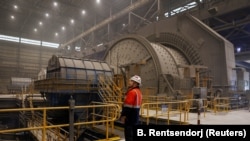The United States is taking steps to achieve a more secure and resilient global supply chain, especially in critical minerals. The U.S. Department of Energy notes that critical minerals are important to U.S. national security and economic development.
Critical minerals are typically imported to the United States and are particularly vulnerable to supply chain disruptions. According to the Department of Energy, the United States faces a lack of certain critical minerals that support clean energy technologies, such as wind turbine generators, and other important technologies such as semiconductors.
To address this issue, the United States hosted the first U.S.-Mongolia-Republic of Korea (ROK) Critical Minerals Dialogue. The purpose of the dialogue was to highlight the importance and potential role Mongolia could play in meeting the world’s critical mineral needs.
“Critical minerals play an increasingly important role in our economies,” said Under Secretary of State for Economic Growth, Energy, and the Environment Jose W. Fernandez in a tweet. “As Mongolia’s strategic partner, we share mutual interest in strengthening our economies and making them more resilient.”
In order to further this cooperation, the United States signed a Memorandum of Understanding (MOU) with Mongolia. The MOU includes a framework for Mongolia and the United States to “work together on technical areas of support to further Mongolia’s efforts to develop capacity to encourage investment in its mineral resource sector.”
The Republic of Korea, the other participant in the Critical Minerals Dialogue, is a leading partner in the Minerals Security Partnership (MSP). The MSP is an ambitious initiative between the United States and other key partners to ensure that critical minerals are produced, processed, and recycled in a way that realizes each country’s full economic potential.
Demand for critical minerals, which are essential for clean energy and other technologies, will expand significantly in the coming decades. That is why United States is committed to expanding the partnership with both Mongolia the Republic of Korea, which will be crucial for securing critical mineral supply chains.

















